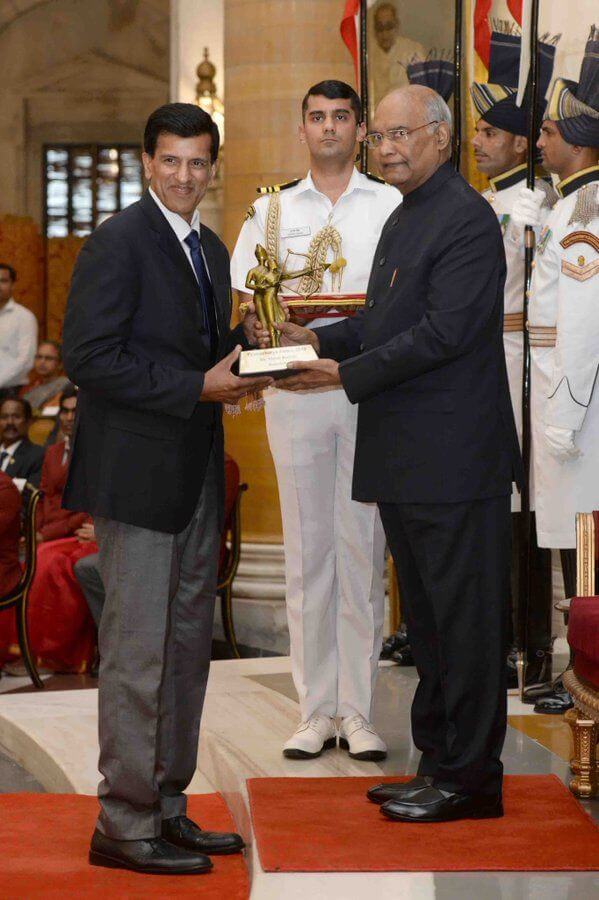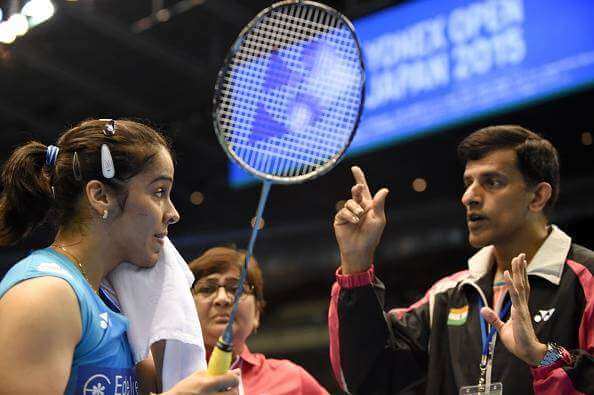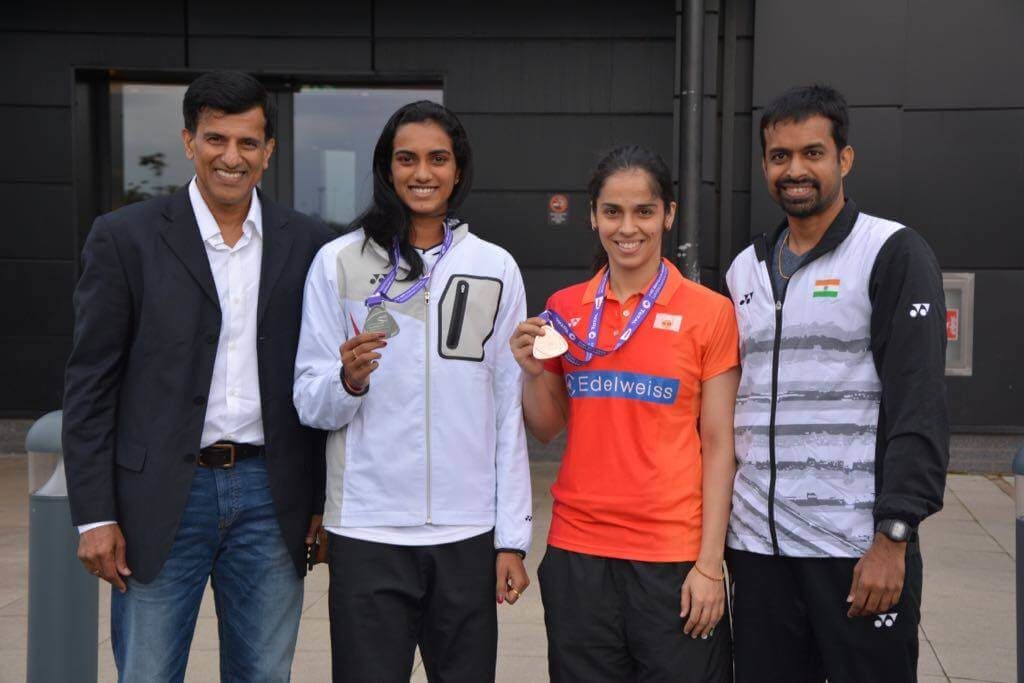Badminton
Vimal Kumar - The Drona who trained some of the top stars of Indian badminton
When U. Vimal Kumar received the coveted Dronacharya award, it was a recognition of his dedicated approach to training some of the top stars of Indian badminton.

When U. Vimal Kumar, the doyen of badminton coaching, received the coveted Dronacharya award from the President recently, it was a recognition of his dedicated approach to training some of the top stars of Indian badminton like P. Gopichand, Saina Nehwal, P. Kashyap, Trupti Murugunde, Ashwini Ponnappa and earlier Manjusha Pawangadkar, Aparna Popat ,Dipankar Bhattacharjee and scores of others . He made them stars in their own right and along with Prakash Padukone, made the Prakash Padukone Badminton academy a nursery of Indian badminton.
The National champion of 1988 and 1989, who also represented the country in the Barcelona Olympics in 1992, has always been innovative, firm in his role as the coach, but remains a modest and an affable person, who is always ready to share his vast knowledge of the game with players and other coaches.
In an interview on this Teachers Day, Vimal, the master teacher of badminton, speaks about his work.
The excerpts:
Vimal how do you feel about getting the Dronacharya award, the highest recognition for a sports coach in the country?
I am quite happy to receive it -- it is a recognition by the badminton fraternity and the Union Sports Ministry. I was against the process of applying for an award. I always felt that it should come when due. The Badminton Association of India recommended me, and I think it is for the first time, they did so. Yes, it is a great recognition.

After your impressive playing career, when did you decide to become a coach?
When I was playing in England, I had a contract with Slazenger, the sports gear firm. One of the clauses of the agreement was that I and others who were contracted had to teach in leisure and sports centres in the UK. So I used to go there and teach youngsters the fundamentals of the game. Gillian Gilks, the English women’s champion, who had then retired, was also there as a part of the programme. Later, I used to go and teach in the All England Club and earn my living. I then returned to India and joined hands with Prakash Padukone and started the Prakash Padukone Badminton Academy (PPBA).
The PPBA faced some early hurdles, how did you overcome it to make it a premier training centre?
When we started, there was not much support for badminton in the country, we were fortunate to have a tie-up with BPL as our main sponsors, thanks to Mr Rajiv Chandrashekar and Mr Ajit Nambiar, who supported our venture for 10 years, which enabled PPBA to help our top players improve their playing standards and quality of their game.
Infrastructure wise, we started in a small way in the Canara Union in Malleswaram, Bangalore and later moved to Karnataka Badminton Association when courts came up there. Now, we have our own setup at the Padukone-Dravid Centre for Sports Excellence, which has all the facilities. PPBA started in 1994, and this year we are completing 25 years of our operation.
Is there a Vimal method of coaching?
There is nothing as such. Some of the finer points of coaching I imbibed from Prakash Padukone. In fact, I am thankful to two people -- Prakash Padukone and Tom John. Prakash adopted and put into practice his playing techniques into his coaching, and I learnt from that. Tom John was a player and coach from England, who had an aggressive approach. I was able to learn from his methods. The Indian and European style coaching differs a lot, in Asia, coaches tend to dictate terms, while in Europe, the players are asked to take responsibility. Though I am firm when needed, I always make players responsible for what they should be doing and share their views as well.
You have trained some of the top Indian players, who would you rate as the quick learner and who showed great potential?
Some time ago, we had a player Abhishek Bakshi, whom I thought had great potential to make it big, but he quit when he was 19. Earlier, we had Aparna Popat, a multiple-time national women’s champion, who did well despite her physical parameters. Gopichand, of course, was very good and lately, I have trained Saina Nehwal, who, despite certain limitations, is a gutsy player, who never gave up and she is a motivation for the rest, in what one could achieve with sheer determination. Right now, I have a youngster, Lakshya Sen, whom I find very promising, but he is young and has a long way to go.

Is it the Indian era of domination in the game, with P. V. Sindhu riding high with world title?
P. V. Sindhu’s achievement was a special one, and it shows that our players have bridged the gap with top nations and indeed, India is now a top badminton powerhouse with some of our players doing pretty well at the global stage and enjoying a special place in the world rankings. But I don’t discount the Chineses' ability to come back, they were down for a couple of years, but now, several youngsters are coming up there. But our actual achievement as a team should come when we win Thomas Cup, Uber Cup or Sudirman Cup. We have that scope now with a fine crop of youngsters waiting for their turn to make an impact at the World stage.
What was your memorable moment as a coach?
It was when Saina Nehwal, who was training with me, reached the finals of the World Championship and All England championship in 2015, but the happiness was short-lived as she lost both the finals, but she later went on to win the Indian Open and was ranked World No.1 that was rewarding.
Would you like to see any change in the format of the game?
Personally, I am against any further changes other than the one made by the World Badminton Federation in 2006. It made countries like India, Hong Kong, Chinese Taipei and others bridge the gap with China, Indonesia and Korea, who were dominating the game. The current format ensures tough matches, and there is a display of skills. Any further attempt to shorten the scoring will end up turning badminton as boxing matches.

Now that you have the Dronacharya Award in your bag, what are your future goals?
I would love to continue my coaching with PPBA, now with better facilities and quite a few talented youngsters, who have the true potential and I wish to mentor them. We are also in the process of finding a fruitful tie-up with a new sponsor.
Today is Teachers' Day, and do you have any special message for youngsters?
There are a lot of opportunities for youngsters now, and I would like them to take responsibility of taking success and failures in their stride and work hard towards their goals and give their best in whatever they do, either in sports or life.
